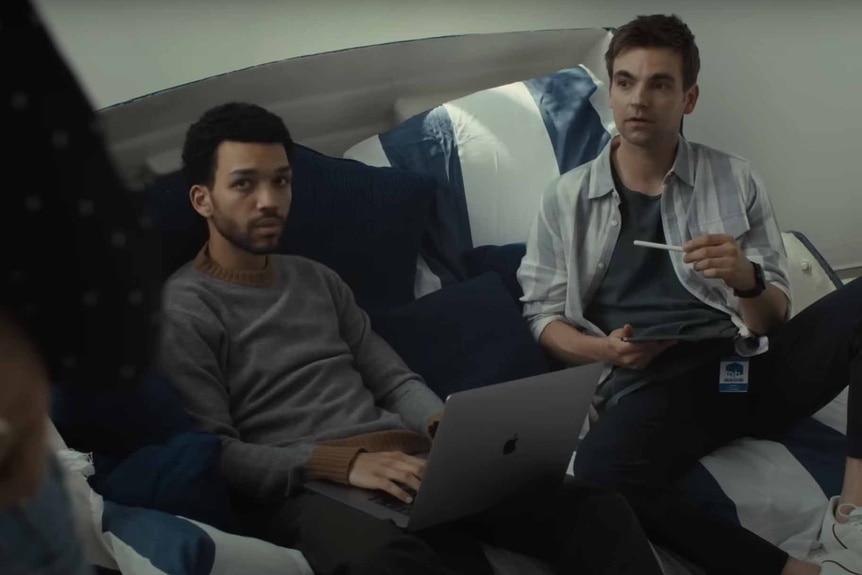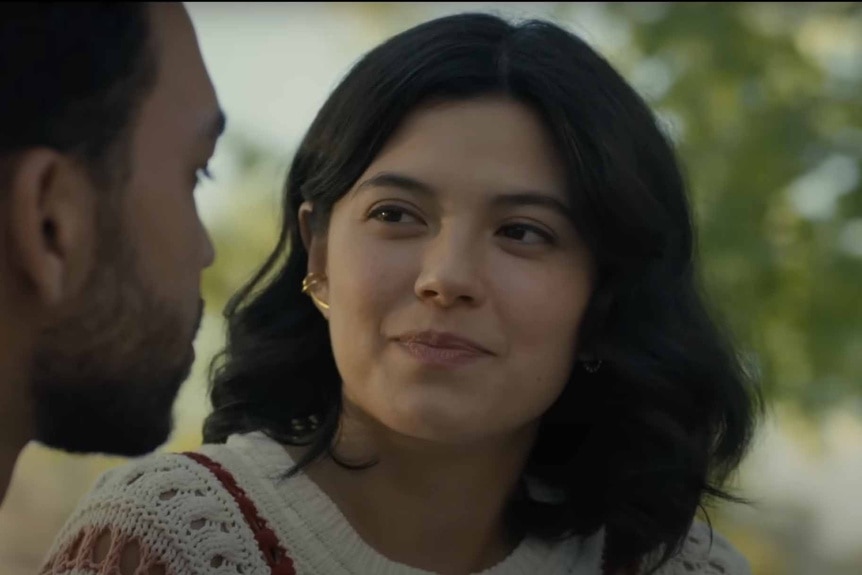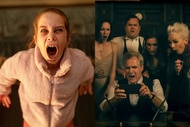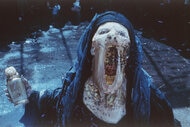Create a free profile to get unlimited access to exclusive videos, sweepstakes, and more!
How The American Society of Magical Negroes Mixes Genres to Get People Talking
Director Kobi Libii and stars Justice Smith, An-Li Bogan, Nicole Byer, and David Alan Grier talk genre swapping.
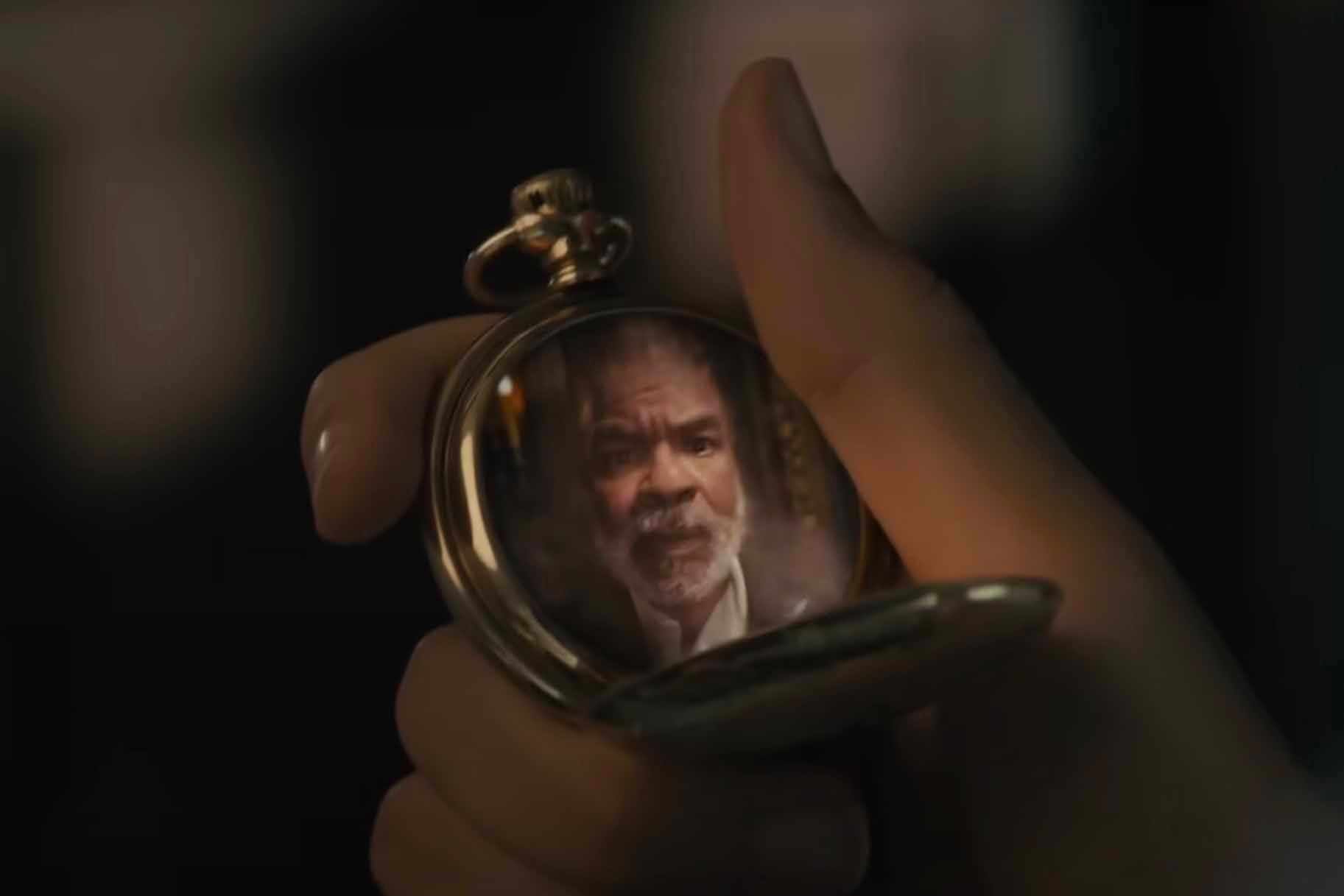
How do you tackle the very sensitive subject of racism and the American Black experience in 2024? If you're first time feature director Kobi Libii, you face the topic head on with The American Society of Magical Negroes. In theaters now, the film has been a passion project for Libii, who wrote the film as well, having workshopped it for years with actor Justice Smith (Jurassic World: Fallen Kingdom) and other mentors through the Sundance filmmaker labs.
The title comes from the term "magical negroes," which filmmaker Spike Lee coined in 2001 when he was doing college tours and confronting Hollywood's ongoing fascination with propping up stories featuring supporting Black characters of wisdom who spend all their time encouraging white protagonists. Libii was fascinated by the concept and developed a script about a secret society of American Black people who made it their job to appease and disarm aggravated white people to protect their race. Obviously it's a satire... sprinkled with some magical realism and a rom com element too.
The final script follows the misadventures of young Los Angeles artist Aren (Smith), who has grown up afraid to rock the boat with anyone, especially white people. When Roger (David Allen Grier) observes the extremely accommodating Aren in action, he recruits him into the society.
Libii and some of his cast, including Smith, Grier, Nicole Byer (DeDe) and An-Li Bogan (Lizzie), sat down with SYFY WIRE to share their experiences working on such a unique film, and about times in their life when they got very real about their own journeys of change.
For More on The American Society of Magical Negroes:
Who's Who in Comedic Fantasy The American Society of Magical Negroes?
The American Society of Magical Negroes Ending, Explained – Will There Be a Sequel?
Who Is Nicole Byer in The American Society of Magical Negroes?
The American Society of Magical Negroes' Kobi Libii and Justice Smith on navigating the drama and comedy of life
Balancing a debut film that incorporates several genres at once might freak out some young filmmakers, but Libii said this script didn't worry him. "It's not, to me, some ambitious, eccentric thing that I'm doing to be deliberately eccentric or deliberately clever about mixing genres," he explained to SYFY WIRE. "It just feels normal, you know? To me, that's part of the wonder of different people getting to tell stories. My normal will feel different than your normal, will feel different than another filmmaker's normal."
Justice Smith agreed, telling us that Libii's script was so adept, the shifts from sweet to satire were seamless to play. "All that is required of us is that level of flexibility," he said. "You would be surprised how many actors don't understand comedy, which is always baffling to me because comedy is an innate part of life, right? We constantly weave through drama and comedy in our day to day."
The actor also praised Bogan, who plays Aren's love interest, for getting the tone too. "I met An-Li when we did our first chemistry reads and it was evident that she understood that from a human level. She understood how to tell a joke and sell a joke, and how to make it truthful and honest and alive. So it wasn't as much of a challenge as you would think."
The American Society of Magical Negroes cast on moments of change in their own lives
During the climax of the film, Aren has a spontaneous moment (in a very inopportune time) where he finally articulates everything he's been holding inside of himself about his place in the world as a young Black man. It's got shades of America Ferrera's Barbie monologue, but also speaks to anyone who has been a people pleaser in life.
Smith said the whole sequence was not a scene that he overly workshopped with Libii because it was so authentic. "Kobi wrote it beautifully," he said. "I knew that all I had to do was show up and be present for that monologue because he articulates what I feel in my personal life, and what I've felt for a long time. I just had to be vulnerable. There wasn't really much of a gap I had to bridge or research I had to do. I just knew that if I showed up, and I learned the lines that it would come. And it did."
Asked if Smith has ever had one of those cathartic, life-changing moments in his own life, he said there have been several. "That's kind of the nature of being a person of color in America," he said with candor. "You constantly have to fight for respect and fight for the right to take up space. I've had conversations with people who I love, with family and friends, where I've had to sit down and have a really honest back and forth about race with them. I'm always grateful to the people who listen. But I've also had conversations with people who don't listen and get incredibly defensive. The point of the film is to promote more conversations like that. I think the only way to true understanding of our fellow man is through conversations, through being honest, through making mistakes, through speaking plainly. Now I look forward to talking about race. I really enjoy it. I think it's fun and it's tricky, but it's good."
Bogan said her moments of change have often come around gender issues. "I've been able to quit some jobs and every time it happens, it feels cathartic," she shared. "But something that's also important to note is I'll have a cathartic moment with somebody and then the next week, I'm doing the same kind of sh--, resorting back to old habits," she smiled. "I feel more entitled to speak my truth now than I did when I was younger. But I still struggle a lot with personal relationships. It's a journey."
Also a comedian, Byer couldn't really conjure an Aren-like moment to mind. "I'm pretty unapologetic about myself," she stated. "But I did discover early on that it's hard to talk about being a fat person because people go, 'Oh, my God, no! You're so pretty!' And... I didn't say I wasn't," she deadpanned. "Or people seem to hold some words as rude or bad that I simply don't. And some people don't want to joke about some things that like, I want to."
Closing out the conversation, Grier welled up while speaking about what his mother instilled in him. "My mom passed away, but I remember when I was 15 and I brought my mom into the dining room. I had this Bob Dylan lyric book and I sat her down, and she was so patient." he paused. "I said, 'Mom, you have to listen.' And I read those lyrics and she gave me so much space and so much time. Because I wanted her to know how important this music was. And she gave me all of that. So, a lot of times, it's just giving people their space, giving their privilege: 'I want to hear what you say, I'm interested to hear what you say and I'm here for it.'"
The American Society of Magical Negroes is in theaters now. Buy tickets at Fandango.
